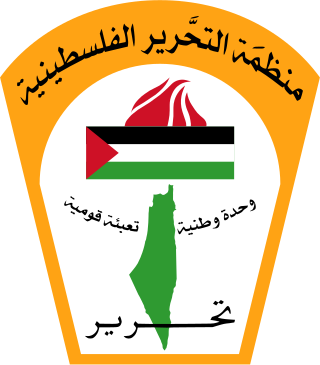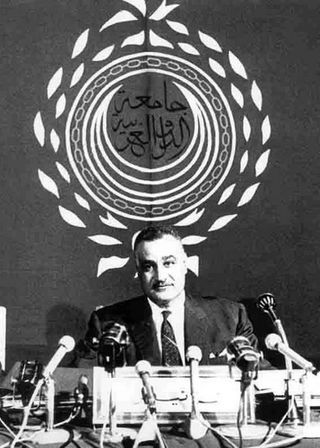
Palestinians are an Arab ethnonational group native to the region of Palestine.

The Palestine Liberation Organization is a Palestinian nationalist coalition that is internationally recognized as the official representative of the Palestinian people in both the Palestinian territories and the diaspora. It is currently represented by the Palestinian Authority based in the West Bank city of Al-Bireh.

The Israeli–Palestinian conflict is an ongoing military and political conflict about land and self-determination within the territory of the former Mandatory Palestine. Key aspects of the conflict include the Israeli occupation of the West Bank and Gaza Strip, the status of Jerusalem, Israeli settlements, borders, security, water rights, the permit regime, Palestinian freedom of movement, and the Palestinian right of return.
Palestinian refugees are citizens of Mandatory Palestine, and their descendants, who fled or were expelled from their country, village or house over the course of the 1948 Palestine war and during the 1967 Six-Day War. Most Palestinian refugees live in or near 68 Palestinian refugee camps across Jordan, Lebanon, Syria, the West Bank and the Gaza Strip. In 2019 more than 5.6 million Palestinian refugees were registered with the United Nations.
In the 20th century, approximately 900,000 Jews migrated, fled, or were expelled from Muslim-majority countries throughout Africa and Asia, primarily as a consequence of the establishment of the State of Israel. Large-scale migrations were also organized, sponsored, and facilitated by Zionist organizations such as Mossad LeAliyah Bet, the Jewish Agency, and the Hebrew Immigrant Aid Society. The mass movement mainly transpired from 1948 to the early 1970s, with one final exodus of Iranian Jews occurring shortly after the Islamic Revolution in 1979–1980. An estimated 650,000 (72%) of these Jews resettled in Israel.

The Palestinian Liberation Front, also known as the Palestine Liberation Front - Abu Abbas Faction or Palestine Liberation Front, is a minor left-wing Palestinian political faction. Since 1997, the PLF has been a designated terrorist organization by the United States and by Canada since 2003. The PLF has also been banned in Japan.

The history of the Israeli–Palestinian conflict traces back to the late 19th century when Zionists sought to establish a homeland for the Jewish people in Ottoman-controlled Palestine, a region roughly corresponding to the Land of Israel in Jewish tradition. The Balfour Declaration of 1917, issued by the British government, endorsed the idea of a Jewish homeland in Palestine, which led to an influx of Jewish immigrants to the region. Following World War II and the Holocaust, international pressure mounted for the establishment of a Jewish state in Palestine, leading to the creation of Israel in 1948.
Intermittent discussions are held by various parties and proposals put forward in an attempt to resolve the Israeli–Palestinian conflict through a peace process. Since the 1970s, there has been a parallel effort made to find terms upon which peace can be agreed to in both this conflict and the wider Arab–Israeli conflict. Notably, the Camp David Accords between Egypt and Israel included discussions on plans for "Palestinian autonomy", but did not include any Palestinian representatives. The autonomy plan would later not be implemented, but its stipulations would to a large extent be represented in the Oslo Accords.
From 1951 to 1952, Operation Ezra and Nehemiah airlifted between 120,000 and 130,000 Iraqi Jews to Israel via Iran and Cyprus. The massive emigration of Iraqi Jews was among the most climactic events of the Jewish exodus from the Muslim World.
Saqr Abu Fakhr is a Palestinian writer living in Lebanon. He is a researcher and author specialized in Arab Affairs, with special focus on Palestinian affairs.

The Palestinian right of return is the political position or principle that Palestinian refugees, both first-generation refugees and their descendants, have a right to return and a right to the property they themselves or their forebears left behind or were forced to leave in what is now Israel and the Palestinian territories during the 1948 Palestinian expulsion and flight and the 1967 Six-Day War.
Palestinian people have a history that is often linked to the history of the Arab Nation. Upon the advent of Islam, Christianity was the major religion of Byzantine Palestine. Soon after the rise of Islam, Palestine was conquered and brought into the rapidly expanding Islamic empire. The Umayyad empire was the first of three successive dynasties to dominate the Arab-Islamic world and rule Palestine, followed by the Abbasids and the Fatimids. Muslim rule was briefly challenged and interrupted in parts of Palestine during the Crusades, but was restored under the Mamluks.
The article describes the state of race relations and racism in the Middle East. Racism is widely condemned throughout the world, with 174 states parties to the International Convention on the Elimination of All Forms of Racial Discrimination by April 8, 2011. In different countries, the forms that racism takes may be different for historic, cultural, religious, economic or demographic reasons.
Sami Hadawi was a Palestinian scholar and author. He is known for documenting the effects of the 1948 Arab–Israeli War on the Arab population in Palestine and publishing statistics for individual villages prior to Israel's establishment. Hadawi worked as a land specialist until he was exiled from Jerusalem after a fierce battle in his neighborhood between Israeli and Jordanian forces. He continued to specialize in documenting Palestine's lands and published several books about the 1948 Palestine war and the Palestinian refugees.

Khaled al-Hassan was an early adviser of Yasser Arafat, PLO leader and a founder of the Palestinian political and militant organization Fatah. Khaled was the older brother of Hani al-Hassan.
Rosemary Sayigh is a British-born journalist and scholar of Middle Eastern history. She is known for her works on the Palestinian people, particularly those forcibly displaced to Lebanon as a result of the Nakba.
Palestinians in Lebanon include the Palestinian refugees who fled to Lebanon during the Nakba, their descendants, the Palestinian militias which resided in Lebanon in the 1970s and 1980s, and Palestinian nationals who moved to Lebanon from countries experiencing conflict, such as Syria. There are roughly 3,000 registered Palestinians and their descendants who hold no identification cards, including refugees of the 1967 Naksa. Many Palestinians in Lebanon are refugees and their descendants, who have been barred from naturalisation, retaining stateless refugee status. However, some Palestinians, mostly Christian women, have received Lebanese citizenship, in some cases through marriage with Lebanese nationals.

The Palestinian diaspora, part of the wider Arab diaspora, are Palestinian people living outside the region of Palestine and Israel. There are 2.1 Mio Arabs in Gaza, 2.9 in West Bank, and 1.65 in Israel. more than 6.1 Mio live outside, most of them in Jordan, Syria, Chile and Lebanon.

Palestinians in Syria are people of Palestinian origin, most of whom have been residing in Syria after they were displaced from their homeland during the 1948 Palestinian expulsion and flight. Palestinians hold most of the same rights as the Syrian population, but cannot become Syrian nationals except in rare cases. In 2011, there were 526,744 registered Palestinian refugees in Syria. Due to the Syrian Civil War, the number of registered refugees has since dropped to about 450,000 due to many Palestinians fleeing to Lebanon, Jordan or elsewhere in the region to escaping to Europe as refugees, especially to Germany and Sweden.

The Casablanca Protocol, formally the Protocol for the Treatment of Palestinians in Arab States, was a statement by the Arab League on 11 September 1965, made at the 1965 Arab League summit in Casablanca, Morocco. The statement, in five articles, sought to regularize the legal protections for Palestinian refugees residing in the countries of the Arab World.








